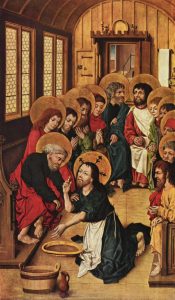- The Sacred Triduum: Service, Sacrifice, Salvation (Part I)
- The Sacred Triduum: Service, Sacrifice, Salvation (Part II)
- The Sacred Triduum: Service, Sacrifice, Salvation (Part III)
- The Sacred Triduum: Service, Sacrifice, Salvation (Part IV)
Service is a basic tenant of many faiths.
At the absolute least, we’re all stuck on this ball of mud together, so we should probably make the best of it.
On a slightly less wry level, cooperation has definite survival benefits for critters that aren’t the biggest or strongest around. Our primitive ancestors relied on combined brain power and coordinated efforts to survive in an environment a bit more hostile than what we’re accustom to now.
But the idea of Service goes above that. It’s not just cooperation. It’s going a little bit out of your way–expending some of your resources–in order to do something that doesn’t directly benefit you. It’s action with a purpose. Action in the name of a cause.

According to the stories told, on Holy Thursday Jesus and his core group of friends and students gathered together. He told them many things. One thing he made very clear was that he was as much a servant as anyone. He shows this not only in his words, but through the action of washing the Apostles’ feet–a job commonly done by slaves in richer households of the time. He tells them, “A slave is no greater than his master, nor is one who is sent greater than the one who sent him. If you know these things, you are blessed if you do them.” (John 13:12-17)
If one chooses to travel along a spiritual path, one chooses to serve a higher power. However that power is conceptualized or personalized, it is something that exists above and beyond normal experience. It is also intrinsically tied to the most mundane of experiences. At one time or another, everyone plays the part of servant, just as surely as they play the part of master. No matter the path they walk.
At the Last Supper, Jesus also makes it very clear that he knows his life is coming to an end. He knows he will be betrayed by one of those trusted twelve, he knows he will be denied by another. And he tells them this.
The path of Service is not always an easy one. People will hate the servant as they hate the master, they will punish the messenger for the message he was sent out to deliver. They will take more than is offered and withhold what is needed. This is base human nature. It is that dark side of humanity that lead to the final events of Good Friday.
The hardship of the choice to walk such a path is increased if you are cursed with prophecy. Jesus knew his death would not be pleasant. In Gethsemane, he asked if he could be released from his service. At that point, it was too late and his fate was sealed with a kiss.
He accepted the fate his path had lead him to, and he told those he left behind to remain true to their pledge of service. (Matthew 26:36-56)
Jesus and his disciples were not the first to walk the path of service, and the most certainly were not the last. Their prophecies and their god differed in many ways from others who served just as painfully and brought about just as much change in their respective times.
Without those who serve willingly, others would suffer all the more.
This is one of the lessons of this story.
Leave a Reply